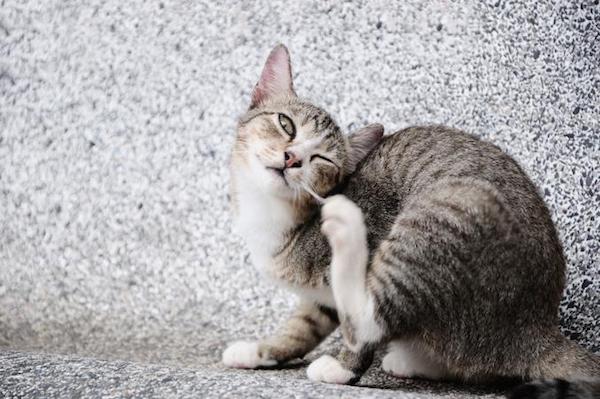What if your cat is shaking his head repeatedly? A cat mostly shakes his head to remove an obstacle in his ears like debris or ear wax. But most of the times the reason is a more serious one. It is a matter to worry about as it could be a symptom of underlying health problems. So what could be the reason for your cat shaking his head?
Reasons Why Your Cat Might Be Shaking His Head
Certainly, there are a number of health issues from minor to major, which seem to be a reason why your cat is shaking the head. Probably, your cat has ear mites or an infection or might be dealing with a serious health problem like infectious peritonitis. Let us try to find out the possible causes for your cat shaking his head.
1. Ear Mites
The most common reason found in a cat for shaking his head is having ear mites. Most often, cats get infected by ear mites from other pets. If your cat is an outdoor one then chances are more of getting infested by ear mites.
Usually, ear mites infestation is noticed in kittens but adult cats also get infected when they come in contact with other infected animals. The parasites feed on the skin oils and wax inside your pet’s ears. As ear mites can barely be seen by naked eyes, you need to take your cat to the doctor for diagnosis under a microscope.
Symptoms in Cats Having Ear Mites
The symptoms of ear mites in cats are:
- Scratching ears with paws
- Redness, bumps or swelling inside the ear
- Swelling on ear flaps due to scratching
- Outside of cat’s ear can be crusty
- Dark, grainy and wax-like discharge from ears which might look like grounded coffee
- A strong odor from ears
Home Remedies for Cat Ear Mites
Ear mites are common in cats and they spread among animals. If you have other pets who have ear mites, it is common that they might spread to your cat too.
Treatment mostly involves removing debris from ears and using a topical insecticide to kill all the mites. It is also essential to remove all the eggs from the ears. All pets in the house have to be treated for mites, otherwise, they keep getting infected again and again.
Do not start treating your pets until you are sure that they have mites. Get them checked with a doctor or self-check by taking a sample from your cat’s ear through a cotton ball. Examine it under a microscope or magnifier in a proper light.
Once you are sure that your cat is infected by mites, you can use the best cat ear cleaners available at pet stores or use olive oil(consult with your vet first). Put drops of solution in the ear canal and massage gently. Remove all the debris by wiping it away with a cotton ball. Do not use cotton swabs, it can hurt your cat’s ear.
Now use an ear miticide designed for cats especially(as others might be too harsh for cats). Follow the directions properly and clean away the mites. A single cleaning might not solve the problem completely, as the eggs will still be present in, but your cat might get relief for a while. You will have to clean your cat daily to get rid of the problem completely.
2. Cat Shaking His Head but Not Having Ear Mites
After diagnosis, if you find no mites then probably your cat has some other ear-related problem like an ear infection or an ear hematoma.
-
Ear Infection in Cats
Generally, it is quite common in cats and dogs to have an ear infection. In case, your cat has one he might be shaking his head more often. In particular, infections are caused by bacteria and yeast which are more common in dogs but cats too get affected at times. Mostly pain and discomfort are noticed in an ear infection while other symptoms are similar to those of ear mites infestation: scratching ears with paws, shaking the head, swelling on ear flaps or inside ears, a dark waxy discharge and odor from ears
-
How to Treat Cat Ear Infections?
A careful diagnosis is necessary to decide on a proper treatment method. Various fungi or bacterias can cause an ear infection. A drug cannot be prescribed without knowing the kind of infection and a reason behind it. Your veterinarian doctor can best suggest, which drops or drugs to use, which treatment method to follow and what prevention measures should be taken to free your cat from ear infections.
-
Cat Ear Hematoma
Your cat can also develop an ear hematoma because of ear mites or ear infection. As a result of over-scratching ears by paws, cats develop a blood clot mostly in the outer layer of the ear flap. Ear hematomas can easily be diagnosed by physical examination.
-
Will a Cat Ear Hematoma Go on Its Own?
In fact, ear hematomas may not cure by themselves. They require proper medical attention and further prevention methods. After giving anesthesia, the vet might make an incision along the length of the hematoma inside the ear canal to remove the fluid and the blood clot. The incision will be left open so the fluid keeps draining as the ear heals.
Other Reasons Why Your Cat Must Be Shaking His Head
If your cat is not facing any of the above issues then there are few other health problems that cause shaky head in cats.
An Oral or Throat Problem
For the reason, that ear, nose, and throat are closely connected, your cat might shake his head if he has a problem in his mouth or throat. In such a case you must also notice other symptoms like
- Drooling
- Pawing on the mouth
- Bad breath
- Loss of hunger
- Difficulty in eating
- Agitation
- Ticklishness or reactivity around the mouth
Issue in Pancreas
The pancreas has a major role in the secretion of insulin. Therefore, if the pancreas is not functioning properly because of tumors or some other interference, then your cat might be suffering from a condition called Insulinoma. In the condition, the pancreas produces insulin in a higher amount than required and one of the symptoms is head shaking. You should look for the following symptoms too:
- Face twitching
- Ear twitching
- Unsteady walk
- Seizures
- Decreased concentration
Feline Infectious Peritonitis
A very rare infectious disease in cats which is deadly and incurable. By any chance, if your cat is suffering from Feline Infectious Peritonitis then you might notice these symptoms:
- Shaking head
- Yellowish eyelids
- Decrease in appetite
- Weight loss
- Dull coat
- Seizures
Final Note
As a whole, if a cat is correctly diagnosed then he can easily be treated for ear infections or ear mites. In cases, where cats have remained untreated because of the problem remained unidentified, the results are not hopeful.
To be taken in mind, if you are unable to find out the complication and the symptoms are other than those of the ear mites, then better take your cat for a proper examination to a veterinary doctor and follow a careful treatment method.


